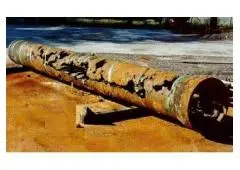Guarding Against Corrosion: The Role of Corrosion Inhibitors
Description
Corrosion inhibitors are vital compounds utilized across various industries to protect metal surfaces from degradation caused by chemical reactions with the surrounding environment. Corrosion, a natural process, occurs when metals react with substances such as oxygen, moisture, or chemicals, leading to the deterioration of the metal and potential structural failure. Corrosion inhibitors work by either forming a protective barrier on the metal surface or by altering the electrochemical processes that drive corrosion. Let's delve into the significance, mechanisms, and applications of corrosion inhibitors:
Significance of Corrosion Inhibitors:
Preservation of Structural Integrity: Corrosion inhibitors are instrumental in safeguarding metal structures, equipment, and components from the damaging effects of corrosion. By inhibiting corrosion, these compounds help maintain the structural integrity and functionality of critical assets, reducing the risk of failures, accidents, and costly repairs.
Extension of Service Life: The application of corrosion inhibitors can significantly prolong the service life of metal assets, thereby reducing replacement costs and downtime. By mitigating corrosion-related damage, these compounds allow for longer intervals between maintenance and replacement cycles, enhancing operational efficiency and cost-effectiveness.
Enhanced Safety and Reliability: Corrosion inhibitors contribute to the overall safety and reliability of industrial infrastructure, transportation systems, and consumer products by preventing corrosion-induced failures and accidents. This is particularly important in sectors such as aerospace, automotive, maritime, and oil and gas, where safety and reliability are paramount.
Mechanisms of Corrosion Inhibition:
Barrier Protection: Some corrosion inhibitors form a physical or chemical barrier on the metal surface, preventing corrosive agents from coming into contact with the metal substrate. This barrier impedes the diffusion of oxygen, moisture, or chemicals, thereby inhibiting corrosion and rust formation.
Passivation: Certain corrosion inhibitors promote the formation of a passive oxide layer on the metal surface, which acts as a protective barrier against further corrosion. This passive layer reduces the metal's reactivity and susceptibility to corrosion in aggressive environments.
Polarization Inhibition: Corrosion inhibitors may interfere with the electrochemical reactions that drive corrosion by altering the polarization behavior of the metal surface. These inhibitors can inhibit either the anodic or cathodic reactions involved in corrosion, thereby suppressing the overall corrosion rate.
Applications of Corrosion Inhibitors:
Metal Coatings and Paints: Corrosion inhibitors are commonly incorporated into metal coatings, paints, and primers to provide long-term corrosion protection for structural steel, automotive components, marine vessels, and consumer products. These coatings form a durable protective barrier over the metal surface, shielding it from corrosive elements.
Cooling Water Treatment: Corrosion inhibitors are essential additives in cooling water treatment programs used in industrial cooling towers, boilers, and HVAC systems. These inhibitors protect metal components from corrosion and scale formation, extending equipment lifespan and maintaining system efficiency.
Oil and Gas Production: Corrosion inhibitors are employed in oil and gas production operations to protect pipelines, storage tanks, and production equipment from corrosion caused by aggressive fluids, such as saltwater and acidic gases. These inhibitors help mitigate corrosion-related risks and ensure the integrity of critical infrastructure.
Metalworking Fluids: Corrosion inhibitors are integral components of metalworking fluids, including cutting oils, lubricants, and hydraulic fluids, used in machining, milling, and metal fabrication processes. These inhibitors protect metal surfaces from corrosion during machining operations, prolonging tool life and improving machining efficiency.
Conclusion:
In conclusion, corrosion inhibitors play a crucial role in preserving the integrity, safety, and reliability of metal assets across various industries. By inhibiting corrosion and rust formation through barrier protection, passivation, or polarization inhibition mechanisms, these compounds help mitigate the costly and detrimental effects of corrosion on infrastructure, equipment, and components. Whether in metal coatings, cooling water systems, oil and gas production, or metalworking fluids, corrosion inhibitors serve as indispensable tools in corrosion prevention strategies, ensuring the long-term performance and sustainability of critical assets.






Useful information
- Avoid scams by acting locally or paying with PayPal
- Never pay with Western Union, Moneygram or other anonymous payment services
- Don't buy or sell outside of your country. Don't accept cashier cheques from outside your country
- This site is never involved in any transaction, and does not handle payments, shipping, guarantee transactions, provide escrow services, or offer "buyer protection" or "seller certification"







